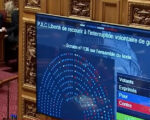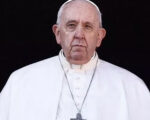>> Reality Special My Husband’s Not Gay: Deep in Denial?
A TLC special looks at Mormon men who are attracted to other men, yet have married women.
”Aucun mariage n’est parfait, le nôtre ne l’est pas. mais avec notre foi en Dieu, nous croyons pouvoir tout affronter”, explique l’un des hommes mariés dans la bande-annonce de l’émission…
Les Etats-Unis ne cessent d’aller toujours plus loin en matière de téléréalité. Cette fois, la chaîne américaine TLC a décidé de s’intéresser à la sexualité des couples mariés, mais pas n’importe lesquels. Dans l’émission My Husband’s Not Gay (ndlr Mon Mari n’est pas gay), diffusée le 11 janvier outre-Atlantique, les téléspectateurs pourront suivre trois couples Mormons, dont les hommes avouent ouvertement être attirés par le même sexe. Alors que ces derniers refoulent leur orientation sexuelle pour des raisons religieuses, ils aideront leur ami célibataire, également gay, à trouver la femme de sa vie dans leur communauté chrétienne.
Reste à savoir si des retournements de situation sont prévus dans le programme et si certains hommes iront à l’encontre de leurs croyances et des traditions. Quelques couples pourraient en effet bien être déstabilisés au sein de cette émission, qui pointe notamment du doigt le poids de la société et de la religion dans le choix de l’orientation sexuelle.
>> In January, TLC will air a new reality show: My Husband’s Not Gay, a series about Mormon men who are attracted to men but still date and marry women.
It’s like Say Yes To The Dress, if Say Yes To The Dress were about couples who aren’t sexually attracted to each other but go ahead and get married anyway, for religious reasons, and if the whole enterprise made you feel uncomfortable and vaguely sad.
Three of the men in the show are married — though they openly discuss their feelings for other men — and one is single, identifies openly as gay, but (as far as the promo reveals) very much wants to be married to a woman. “I’m attracted to my wife, for sure,” says one of the cast members. “And I’m definitely attracted to men, too.”
The tone of 90-second promo is a sort of flippant and tongue-in-cheek for a show that is navigating some sensitive territory. “In Salt Lake City, Utah,” text on a black screen reads. “There is a group of Mormons who live their lives a little differently.” Live their lives a little differently? What is that cutesy, winking language? At other moments, the men appear to get almost too introspective for the reality-show framework. The single man says that he “want[s] to marry a woman, but I don’t know how to work out these feelings.” The married men in the clip discuss their sexuality as something that can be “overcome” through faith and effort; one man says, “There’s no marriage that is perfect. Ours isn’t, but with our faith in God, we believe we can overcome anything.”
Hopefully the show will introduce voices who don’t think of homosexuality as something to “overcome.” But that doesn’t seem too likely. In October, a high-ranking church leader reiterated the Mormon opposition to same-sex marriage during a Mormon biannual conference in Salt Lake City. This marked the third conference in a row in which Mormon leaders declared that marriage should only occur between a man and a woman. That came just six months after a different Mormon leader made a similar announcement at a conference: “While many governments and well-meaning individuals have redefined marriage, the Lord has not.”
Though opposition to gay marriage is a central tenant of the Mormon faith, the church’s stance on homosexuality as softened somewhat since 2008, when the fight over California’s Proposition 8 led some to complain the church was too intolerant for a modern society. While the church used to be deem it a sin to be gay, it is now not considered sinful so long as an individual abstains from homosexual relations in any way. Two years ago, the Mormon church launched the website “Love One Another: A Discussion on Same-Sex Attraction,” at mormonsandgays.org. At the time of the launch, Elder Dallin H. Oaks — the same leader who spoke at the conference in October — explained the church’s evolving stance on sexuality: “What we do know is that the doctrine of the Church—that sexual activity should only occur between a man and a woman who are married—has not changed and is not changing. But what is changing and what needs to change is to help our own members and families understand how to deal with same-gender attraction.”
This phenomenon that TLC aims to document isn’t a new or unexplored one. In 2012, Josh Weed, a self-described “devout and believing Mormon” who works as a family therapist, wrote a 6,000-word post on his blog, “In Which I Come Out Of The Closet On Our Ten Year Anniversary.” He and his wife wrote the post together. “This is the post where I tell you that I, Josh Weed, am homosexual,” the post reads. “The premise of this post is to share that not only am I homosexual, but I’m also a devout and believing Mormon. And that I’m very happily married to a woman, and have been for ten years now… . I am sexually attracted to men. I am not sexually attracted to women.” Yet he wrote that sex with his wife was “enjoyable” and that their connection was all the more deep because “we weren’t distracted by the powerful chemicals of infatuation and obsession that usually bring a couple together (which dwindle dramatically after the first few years of marriage anyway.)” In an FAQ-section, Weed poses the obvious rebuttal to his decision — basically, why not be out and date men if you know that’s what you want — and, he wrote, “If you are Mormon and you choose to live your religion, you are sacrificing the ability to have a romantic relationship with a same-sex partner.”
Weed’s post went viral and sparked a tumultuous debate within both the Mormon and LGBT community. Weed is a licensed marriage and family therapist associate; critics raised concerns that Weed was trying to convince gay men that a “straight” life wasn’t just possible but an exciting, have-it-all alternative to having to choose between sexual orientation and religion. (Weed claimed this was not the case and he did not intend to be seen as an example.) John Dehlin is a Mormon who produces a podcast about Mormons who experience conflicting and complicated feelings about their religion; his master’s dissertation “focused on the experiences of gay, lesbian, bisexual, and transgender Mormons — with a specific focus on the prevalence, ineffectiveness, and harm of sexual orientation change efforts for LGBT Mormons and former Mormons.” He vehemently disagreed with Weed’s teachings: “Using religion or spirituality as a way to manage your sexual orientation, by being extra righteous, or extra faithful, as a way to sort of suppress those feelings, or control yourself, is the most damaging way to cope with your same-sex attraction.”










